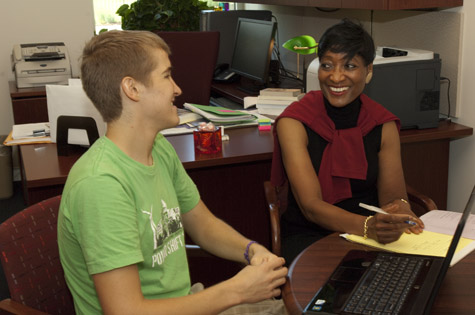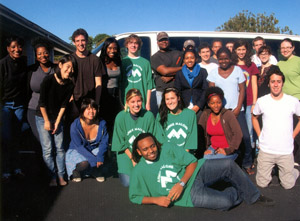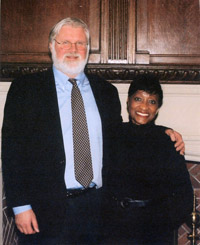
David Kilper
Carol Camp Yeakey, PhD (right), founding director of the interdisciplinary program in Urban Studies and of the Center on Urban Research and Public Policy and professor of education, of urban studies, of international and area studies and of American culture studies, all in Arts & Sciences, meets with Adam Hasz, an Arts & Sciences junior majoring in urban studies and environmental biology. Yeakey “invests a great deal of time with students, serving as both mentor and adviser,” says William F. Tate, PhD, the Edward Mallinckrodt Distinguished University Professor in Arts & Sciences and chair of the education department.
Born and raised in Chicago, Carol Camp Yeakey knew from an early age that cities would play a commanding role in her life.
“As a result of growing up in the city, I always felt the significance of diversity and the intermix or personalities, politics and business with federal, state and local interests, and how they combine to impact the lives and sustainability of the city’s various populations,” Yeakey says.
She is closely examining those factors as founding director and professor of the interdisciplinary program in Urban Studies in Arts & Sciences and as the founding director of the Center on Urban Research and Public Policy.
“My interest in urban studies resulted from being raised in Chicago and recognizing the role that cities play not only in the lives of their citizenry but in terms of the world,” says Yeakey, PhD, who also is professor of education, of International and Area Studies and of American Culture Studies, all in Arts & Sciences.
“If you look at the population of the world today, the majority of humans live in not only cities, but megacities, our new global cities,” she says. “Political leaders and ordinary citizens need reliable policy research and opportunities for public discussion on issues of concern to global populations.”
Urban studies
Yeakey arrived at Washington University in 2004. The Center on Urban Research and Public Policy and the interdisciplinary program in Urban Studies were established in the fall of 2006.
“The center is the research arm of the academic program,” Yeakey says. “The program is completely interdisciplinary. We have students who are also majoring in pre-med, pre-law, engineering, political science, economics, environmental sciences, history, art and more. You name a program, and I have students who are dual majors with Urban Studies.”
Urban studies is a general course of study for students who go on to get graduate degrees in sociology, urban politics and policy, law, medicine and others.
“The program teaches students how cities operate and interact with their various communities homogeneously and heterogeneously, locally, nationally and internationally,” Yeakey says. “Because the field is interdisciplinary, our students take courses from a broad range of fields of public health to economics. The field cuts across all disciplines.”
Students have interned in state’s attorney’s offices, hospitals and municipal redevelopment corporations as well as governmental and nongovernmental agencies throughout the country.

Courtesy photo
Yeakey (far left) poses with students in her fall 2009 course “Introduction to Urban Studies.” The group was on a field trip to the Annie Malone Children & Family Service Center in St. Louis, where it helped plant a community garden.
Yeakey is proud of the success of the newly created program.
“I’ll be honest, I was initially concerned about our first graduating class,” she says. “I thought, ‘We are a very new program at a very good school. How will our peer institutions perceive us?’
“That question was answered when our first graduates were accepted to Harvard Law School, Harvard’s Kennedy School of Government, the University of Chicago, the Massachusetts Institute of Technology and Georgetown University,” she says. “That lets me know that the executive committee did its job in designing an intellectually challenging and respected course of study, coupled with our internships and study abroad options.”
Study abroad programs for Urban Studies are at Oxford University, the London School of Economics and Political Science, and the University of Cape Town in South Africa.
Efforts pay off
“Professor Carol Camp Yeakey is a distinguished scholar and important academic leader,” says William F. Tate, PhD, the Edward Mallinckrodt Distinguished University Professor in Arts & Sciences and chair of the Department of Education. “She has brought both energy and vision to our programmatic areas in urban education as well as urban studies more broadly defined.
“She also invests a great deal of time with students, serving as both mentor and adviser,” Tate says. “This part of her Washington University experience is not transparent, but nevertheless, I think it is one of her most significant contributions to our intellectual community. Her leadership has played a pivotal role in creating opportunities for scholarly discussions about conditions in cities across the globe.”
Prior to coming to WUSTL, Yeakey served on the graduate faculty at the University of Virginia. She earned a doctorate in organization theory and public policy from Northwestern University.
She initially was a public school teacher and administrator in the Chicago Public Schools. She also has served on the graduate faculties of Purdue University, Rutgers University and the Teachers College at Columbia University. She completed postdoctoral work at Yale University.
She has been a Rockefeller Fellow and a Bush Fellow at the Bush Center for Child Development and Social Policy in the Department of Psychology at Yale University; a Ford Fellow of the National Academy of Education; and a Dartmouth Fellow at the Center for the Study of Comparative Politics and Inter-group Relations in the Department of Sociology at Dartmouth College.

Courtesy photo
Yeakey with Douglas S. Massey, PhD, the 2008 Biennial Lecturer for the Center on Urban Research and Public Policy. Massey is the Henry G. Bryant Professor of Sociology and Public Affairs at Princeton University.
In 2010, Yeakey was awarded the Distinguished Career Contribution Award from the American Educational Research Association.
This fall, she will teach “The Study of Cities in Metropolitan America.” In the spring, she will teach “Neighborhoods, Schools and Social Inequality.”
Her primary area of research is social welfare politics and policy as it pertains to children, young adults and families. She has published extensively in national and international social science research journals. Yeakey has co-edited and co-authored seven books. Her next two authored books, currently under way, focus on urban marginality and urban renewal in select cities in the United States.
St. Louis and Chicago
Yeakey enjoys working at the university.
“I think Washington University has tremendous richness intellectually and culturally,” she says. “The university is positioning itself locally, nationally and internationally to confront the pressing issues of our day.”
Yeakey enjoys reading mysteries, biking and playing golf in summer leagues in St. Louis and Chicago.
“Chicago will always be home, no matter where I go,” she says. “Chicago’s positioning as a global city is significant as it confronts the most challenging dynamics of our time. In many ways, Chicago serves as a prototype of what major urban centers will have to strive toward in the next century.”
While she enjoys St. Louis, one aspect of living here has been difficult to fully embrace.
“Coming from Chicago, it is challenging to be a Cardinals fan,” Yeakey says. “But, I’m trying.”
Fast facts about Carol Camp Yeakey
Hometown: Chicago
Title: Founding director and professor of the interdisciplinary program in Urban Studies and founding director of the Center on Urban Research and Public Policy
Also has appointments in: Education, International and Area Studies and American Culture Studies
Quote: “Coming from Chicago, it is challenging to be a Cardinals fan. But, I’m trying.”